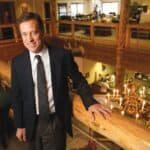Read The
Current Issue
Energy Efficiency Made Easy
Jackson’s Energy Conservation Works helps local homeowners and businesses see where they’re wasting energy and offers loans to help fix the problems.
by Kylie Mohr
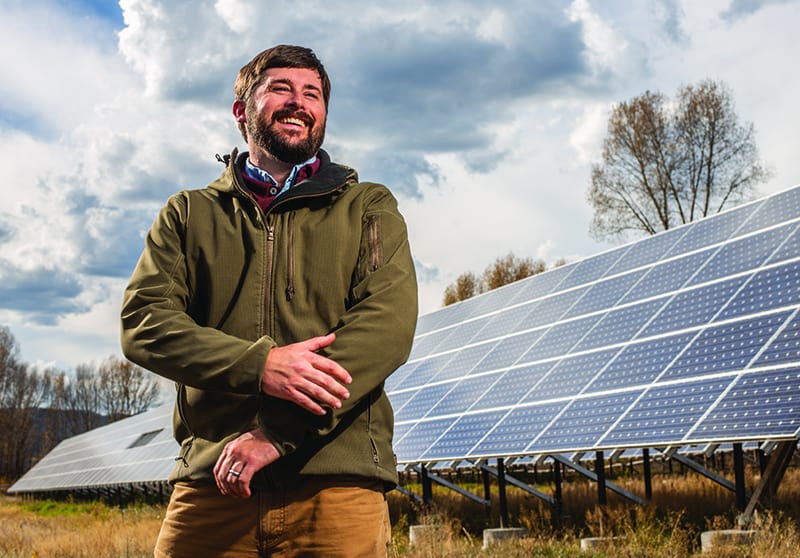
Energy Conservation Works Executive Director Phil Cameron at Jackson’s South Park solar array. Photo by Price Chambers
KATIE DAHLGREN, 36 and Josh Mickelson, 37, peered into a thermal camera while juggling their toddler. “Wow! Oh!” they murmured as Scott Paulson, the owner of Resource Efficient Solutions, showed them exactly where their house leaked heat. Dahlgren and Mickelson hired Paulson to do an energy audit of their home. They wanted to be informed homeowners and hoped the audit would reveal where and how they could make their home more energy efficient. Increased energy efficiency would both save them money on their heating bills and help out the Earth.
Energy Conservation Works (ECW) is a local partnership between the Town of Jackson, Teton County, and Lower Valley Energy (LVE). It works to implement and advocate for energy conservation and emissions reduction in Jackson Hole and encourages local homeowners and businesses to sign up for energy audits. The cost of an energy audit depends on the specifics of the house, the size, the complexity, and the heating systems involved. They start at $100, and ECW refunds that to homeowners if they complete any of the recommendations.
“Go buy some tubes of caulk, weather stripping, and a can of spray foam and you’ll have spent fifty bucks and have a noticeable improvement.”
— Scott Paulson, owner of Resource Efficient Solutions
Last fall, Paulson started his energy audit of Mickelson and Dahlgren’s, who is a sustainability engineer and has served on the Wyoming chapter of the U.S. Green Building Council, home near the base of Snow King by talking to them about what their goals are. “Every audit starts with me getting an understanding of why homeowners are doing it,” says Paulson, who does about one hundred audits annually. “The typical reasons are to improve comfort, improve energy efficiency, and help with building durability issues.” After talking with the couple, Paulson got to work. Over several hours he conducted a blower door test and assessed the property’s grading, venting, insulating, heating, and overall structural durability.
A couple of weeks later, a detailed report and analysis of what Paulson found appeared in Dahlgren and Mickelson’s email inboxes. Also included in Paulson’s report was a cost/benefit analysis of things the couple could do to make their home more energy efficient.
While Paulson’s report includes what he calls “sexy” improvements like solar panels, it also includes numerous less costly options, and he almost always recommends people start with one of these: sealing. He says, “Go buy some tubes of caulk, weather stripping, and a can of spray foam and you’ll have spent fifty bucks and have a noticeable improvement.”
Phil Cameron, ECW’s executive director, says, “Energy and emissions are currently our most pressing environmental issues. ECW’s mission addresses these on both the small scale and at the large scale—helping support home and business owners to address the small, uninteresting aspects of saving energy in their buildings, while also supporting the community in making broad, sweeping choices about how to do more with less energy and to acquire it from more sustainable sources.”
IT WAS FORMER World Bank chairman Jim Wolfensohn who planted the seed that became ECW. At a 2009 fundraising dinner here, Wolfensohn used his keynote speech to challenge the Jackson Hole community to lead the world when it came to energy conservation and renewable energy. At that time,
Mark Barron was mayor of Jackson and accepted the challenge on behalf of the town. Barron quickly formed a committee, organized a summit that focused on sustainable energy, and laid out the 10 x 10 challenge, a friendly competition between the Town of Jackson and Teton County to see if each could reduce its energy consumption 10 percent by 2010.
It was during the energy summit that the Town of Jackson, Teton County, and Lower Valley Energy, an energy cooperative that serves northwestern Wyoming and parts of Idaho, signed a memorandum of understanding that served as the foundation for Energy Conservation Works. While ECW was founded in 2009, it wasn’t until two years later that an executive director was hired. Also in 2011, an official ECW board was created to manage the organization. The ECW board includes a member of Jackson’s Town Council, a Teton County commissioner, LVE’s CEO, an LVE board member, and five citizen members.
Cameron, who has been ECW’s executive director since 2014, says that starting a conversation about energy efficiency isn’t always easy in Wyoming, the largest coal-producing state in the country. But, “it doesn’t need to be divisive,” he says. “Our core philosophy is around using less. The cheapest, cleanest kilowatt hour is the one you don’t use.”
While starting a conversation about energy efficiency isn’t always easy in Wyoming, the largest coal-producing state in the country, “It doesn’t need to be divisive. [ECW’s] core philosophy is around using less. The cheapest, cleanest kilowatt hour is the one you don’t use.”
— ECW Executive Director, Phil Cameron
TO HELP IMPLEMENT the changes recommended in the energy audits ECW subsidizes, the group has a home efficiency loan program. It offers homeowners loans of up to $20,000 to purchase energy efficient windows, solar panels, solar water heaters, ground source heat pumps, and more; improve their home’s insulation; weatherize their home; or install an electric vehicle
charging station, among other things. These loans’ terms are favorable: They are paid back over five years on borrowers’ LVE power bill; loans of up to $7,500 have no interest, loans between $7,500 and $10,000 have a 1.5 percent interest rate, and loans between $10,000 and $20,000 have a 2.5 percent interest rate. There is also a zero percent interest loan program for local businesses that make energy efficient improvements.
In total, ECW has lent about $1.2 million to local homeowners and businesses for energy efficiency projects. Roadhouse Brewing Co., which has a 100 percent renewable energy footprint, built a 100 panel solar array atop its brewery on Gregory Lane. It was able to do that at a cost of $75,000, thanks to a combination of Wyoming Business Council grant money and a loan from ECW. Without the ECW loan, Roadhouse co-founder Colby Cox says, “Most certainly we would have scaled it back. We’re running a business, and we have a duty to our employees and our shareholders and it’s got to make [financial] sense. Unless it was a purely passion project there’s no way you could make it work without ECW.”
Teton Media Works, the owner and publisher of Jackson Hole magazine, the Jackson Hole News&Guide, and the Jackson Hole Daily, also got an ECW loan. It was for $60,000 and covered about one-third of the cost of a new press machine that prints the Daily in one press run. (The company’s former press machine took two press runs to print the same number of daily newspapers.) It is estimated that the new machine will reduce up to 38 percent of
the energy consumption used to print the Daily.
And thanks to an ECW loan, Dahlgren and Mickelson are starting to tackle some of the projects suggested in their energy audit. They have switched from forced air heat to baseboard heat. After the switch, “there’s been a definite difference in our energy usage,” Dahlgren says. She uses Lower Valley Energy’s app to track the difference. “It’s pretty fun to go back to last year at a similar temperature compared to this year and see how much we’re spending,” she says. “It’s
awesome.” The couple has had a contractor price out some of the other suggestions. It may take time, Dahlgren says, but they’re working on it, and thanks to their energy audit, they know exactly how much any changes are worth to them. JH
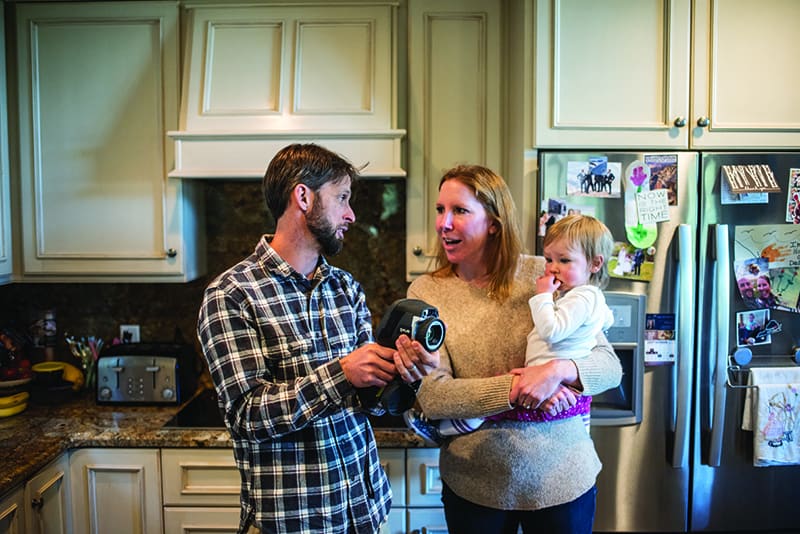
Scott Paulson of Resrouce Efficient Solutions explains the workings of his thermal camera during an energy audit of Katie Dahlgren and Josh Mickelson’s home. Photo by Bradly J. Boner
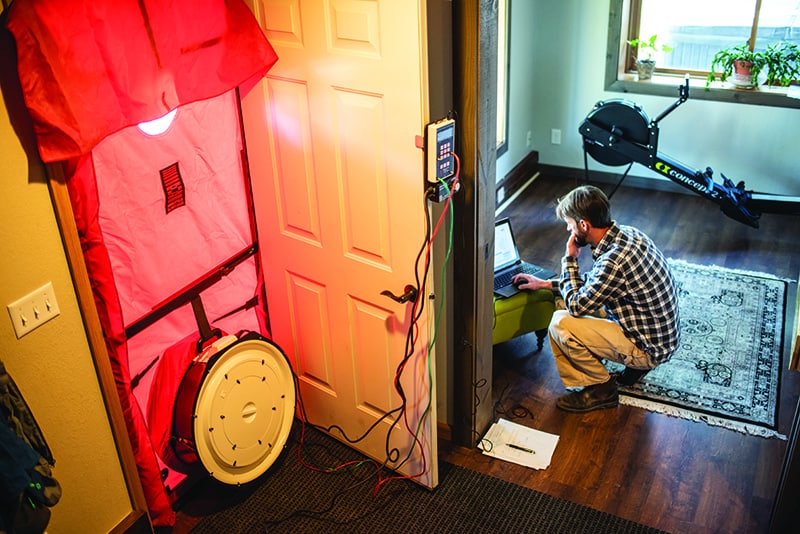
Paulson’s process during an energy audit involves sealing up a building and using a blower door to find air leaks. Photo by Bradly J. Boner

Energy Conservation Works has been working to expand its public outreach, with events like Green Drinks and a booth at the Jackson Hole People’s Market. Photo by Cole Buckhart / Orijin Media

Paulson’s thermal camera shows precisely where heat leaks from a home. Photo by Bradly J. Boner
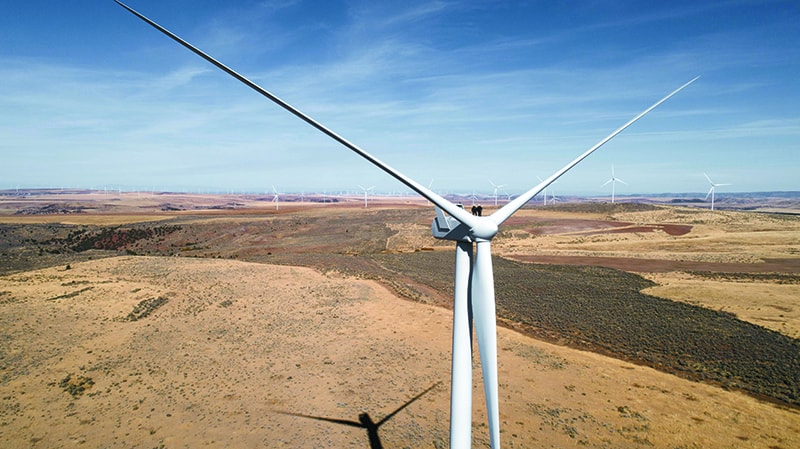
The Horse Butte Wind Farm southeast of Idaho Falls, Idaho, provides green energy to Lower Valley Energy customers. Photo by Zach Montes / Orijin Media
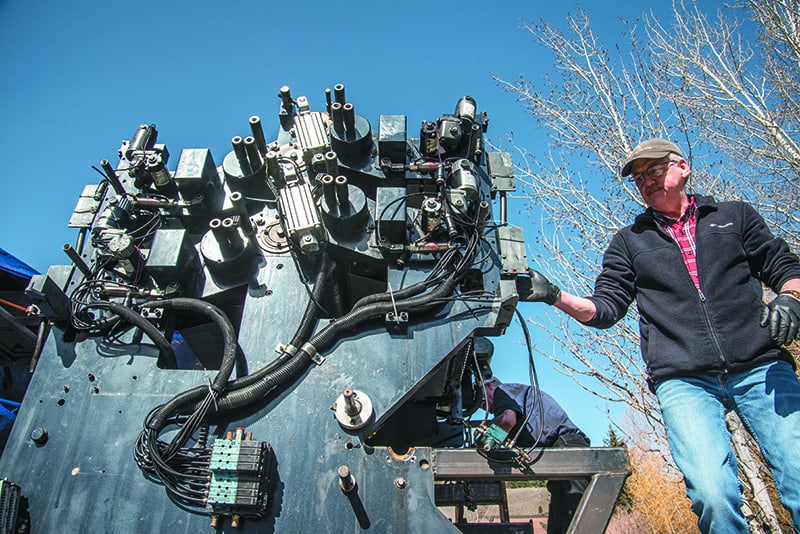
Production manager Chuck Pate welcomes a new press unit to the Jackson Hole News&Guide last spring. Photo by Bradly J. Boner




